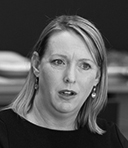Lingering impact of the pandemic
COVID-19 was a traumatic global experience that will undoubtedly have profound and long-lasting consequences. If anything, it has heightened focus on environmental, social and governance (ESG) factors.
CARROLL From a business perspective, we felt a very significant impact from COVID-19. The major lockdown that came into effect nationally last March saw attendance halved across our sector – G8 Education included. The sector was not viable at that level of attendance, so the government stepped in to provide a survival package specifically for our sector.
Together with JobKeeper, this kept the sector viable and enabled us to maintain our employment level. It was helpful, of course – but it also demonstrated our social commitments and the critical role we play in the economy.
Another thing that emerged from the pandemic was that parents engaging with their children at home while they were in lockdown reinforced the value of the teaching we provide on an everyday basis. We rolled out online learning packages to help parents cope during a stressful period and we received feedback that demonstrated a much deeper appreciation of the educational value our sector provides. This is quite apart from the economic value of the place we have in the supply chain from a labour perspective.
This recognition is very pleasing for us. We are keen to see it remain in place in future, part of which is about advancing children’s own understanding of sustainability.
WARD I agree that the pandemic brought forward thinking on sustainability. It is difficult to be positive about going through a pandemic, but it allowed people to sit back, take stock and consider what is important.
The dearth of GSS issuance in the first half of 2020 was not reflective of what was going on in the background. There was a lot of strategic change and nondeal roadshows. We saw many debt-investor updates where companies led by talking about their clients, staff and workplace health and safety.
This was the first time some companies had ever really considered these elements of their business. It was a marked change in recognition of what is important. Investors were also thinking about where they put their money to work and what they finance.
Regulatory developments in Australia also drove engagement with our clients. We normally expect to see three or four ESG questionnaires from clients each year. Last year we had 25 in six months. Our investors are much more interested in what they are financing and why – and the pandemic brought this forward.
SILVER I think some companies saw more clearly the link between environmental limits and the ability of the economy to function. The level of engagement we are having on sustainable debt suggests a much larger and more diverse market.
Another nuance we have noticed in the last six months is that where customers were proffering environmental targets in their sustainability-linked debt, they now also want to wrap environmental and social factors. COVID-19 has brought out these social themes.
This inclusion of social factors reflects the UN Sustainable Development Goals at a macro level and is also close to home in addressing factors like unemployment and poverty. I think this shapes a more balanced sustainable-finance marketplace.
BYRNE It has also made everyone more aware of the importance of the environment around us. Whether because of COVID-19 or the bushfires in early 2020, there is a new general level of awareness.
One thing we recognised in 2020 is the importance of nature for people’s wellbeing, particularly when it comes to mental health. In the long Victorian lockdown, people who had access to green spaces were much better off than those who were stuck at home on teleconference all day.
This awareness can permeate into different areas, including into peoples’ professional lives, and get people thinking about sustainability in their business operations. This can lead to a more strategic shift in thinking about how sustainable finance can be used in implementing business changes.







